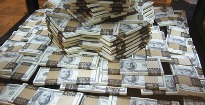Finding Qaddafi's Hidden $70 Billion
 The New York Times reports:
The New York Times reports:
LONDON — As the battle for Libya rages on, the struggle over control of the country’s sovereign wealth fund and its $70 billion in assets has just begun.
With a sizable pot of ready cash and stakes in a few elite European companies — including the British publisher Pearson and the Italian soccer club Juventus — the fund served as an emphatic calling card for its founder, Seif al-Islam el-Qaddafi, a son of the Libyan ruler who was once regarded as the reformer in the family.
Established in 2006, the fund was used by Mr. Qaddafi in an effort to make the case that Libya was ready to open itself to the West. It helped draw into Mr. Qaddafi’s orbit a range of powerful figures, including the Rothschild family, Prince Andrew of Britain, the former European trade commissioner Peter Mandelson, the cream of corporate society in Italy and the American private equity investors Stephen A. Schwarzman of Blackstone and David M. Rubenstein of the Carlyle Group.
The United States said it intended to freeze any Libyan Investment Authority’s assets controlled by American institutions, though no specific bank or asset had been publicly identified. In Britain, officials say the fund will be prevented from selling and repatriating its assets, which include, in addition to its Pearson stake, a small portfolio of commercial real estate holdings in London.
But what remains unclear is to what extent the $50 billion or so of cash and liquid securities in the fund, which operated under the indirect control of Mr. Qaddafi, is accessible to the regime of his father, Col. Muammar el-Qaddafi.
Virtually all of Libya’s riches come from oil, and while the country may well be sitting on a cash mountain, deploying those sums in international markets to buy arms or pay outside fighters is likely to be very difficult.
People who worked closely with the fund said that its inner workings were largely a mystery as bureaucratic inertia and lack of investment expertise kept it from being more active. It made its first outside investments only in 2008. Most of the money is probably held in Libya or in other banks in the Middle East outside of the reach of sanctions.
Click here to read more.

